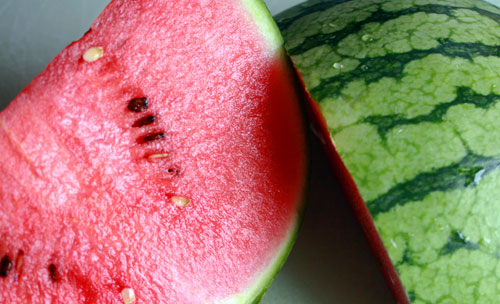A couple of years ago I was lucky enough to have a chance to visit Greece for 2 weeks with my, at the time boyfriend, now husband. There are so many things that I can tell you about that trip, but today as I was walking through the grocery store deciding what to have for dinner, I strolled by a large display of watermelons, and was instantly transported back to Greece. Watermelon, or Karpouzi (CAR-POO-ZEE) in Greek, is a staple in the Greek diet. While in Piraeus, we stayed with Steve’s Theo (Uncle) Spiro and his family. Every night after dinner, Theo Spiro would eat almost half a large karpouzi.

What I know now is that not only is this a great dessert choice, it is choc full of valuable vitamins, and antioxidants, such as the free radical neutralizing, lycopene. It is rich in vitamins, C, A and B. It also is a good source of thiamin, potassium and magnesium. Giving it many added benefits when it comes to energy production (thanks to vitamin B6). And according to some studies, reduces the risk of developing various diseases such as heart disease and some cancers, such as colon cancer, reduces the airway spasm that occurs in asthma, and can alleviate some of the symptoms of osteoarthritis and rheumatoid arthritis.
Watermelon is a nutrient rich food. Because it has such a high water content and only contains 48 calories per cup, it delivers more nutrients per calorie than many other fruits.
It also turns out that eating carrots is not the only way to protect your eyesight. Fruits, like watermelon which is also rich in beta-carotene, are just as important. Eating 3 or more servings of fruit per day may lower your risk of age-related macular degeneration (ARMD), the primary cause of vision loss in older adults, by 36%, compared to persons who consume less than 1.5 servings of fruit daily. (Source: Archives of Ophthalmology) Curious how much fruit makes up 1 serving? See my previous post here: Getting your 5 a day
It has also been associated with numerous other health benefits in recent studies. According to one study, there may be a link between eating lycopene rich foods, like watermelon, and drinking green tea and a man’s reduced risk of getting prostate cancer. (Source: Asia Pacific Journal of Clinical Nutrition, Jian L, Lee AH, et al.)
The benefits go on, and on. I guess Theo Spiro, who is also a Doctor, is on to something. So if you happen to wander through the produce section and see some fresh watermelon in stock this season, stock up! Karpouzi for everyone! And for us, a little walk down memory lane of our trip to Greece as we feast on karpouzi for dessert tonight!

- Karpouzi at a beachside cafe in Naxos

- Scenic and breathtaking Oia, Santorini
